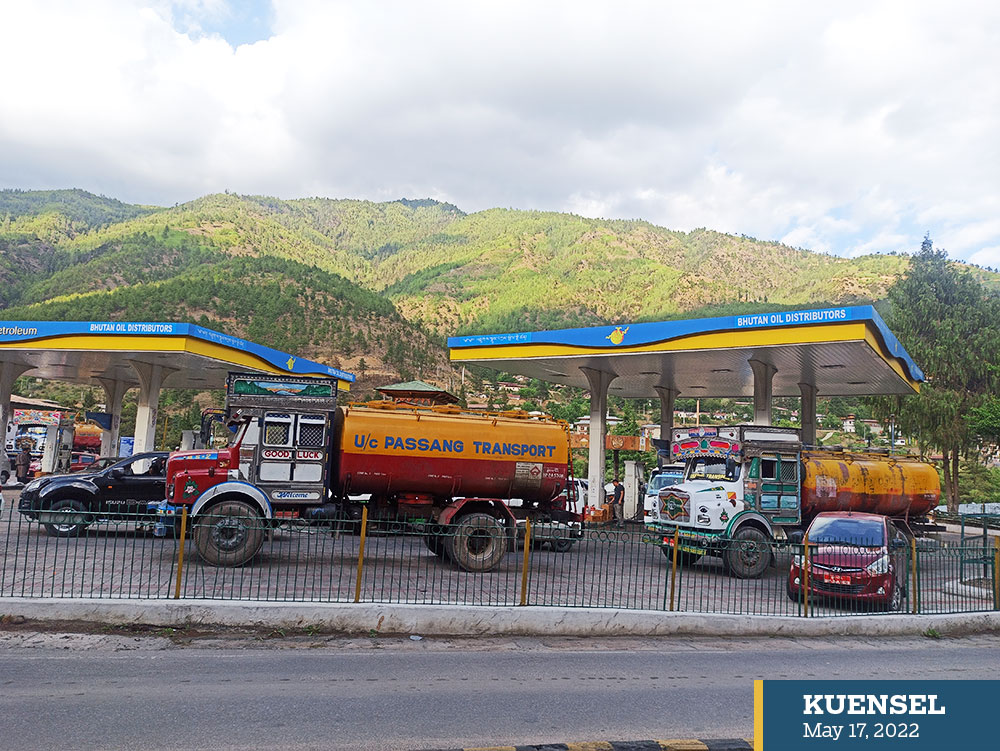Thukten Zangpo
More than 30 truckers in Phuentsholing had not loaded up to supply fuel to the western region yesterday after the recent increase in the price of diesel.
The private transporters supplying fuel to the Tashi’s Bhutan Oil Distributor (BOD) said that they would not transport petroleum, oil, and lubricants (POL) products to the BOD branch offices since freight charges revision did not come through from May 16.
Earlier, when the diesel price increased by almost Nu 7 per litre from midnight of May 1, fuel transporters said that they would not transport fuel from Phuentsholing to Thimphu and other western dzongkhags.
However, fuel transporters came to a consensus after an official from Tashi’s BOD in Phuentsholing told them to wait until May 16.
Similar concerns were raised by about 20 truckers supplying fuel to Druk Petroleum.
They argued that their transportation charge was not revised since 2016 when the price of diesel was Nu 50 a litre.
Transporters claimed that with a government rate of Nu 4.44 per kilolitre (kl) per kilometre (km), a one-way trip for a tanker with a carrying capacity of 12 kl, earns around Nu 16,197.
They fuel in about 115 to 130 litres of diesel for a one-way trip from Phuentsholing to Thimphu, and fuel cost comes to around Nu 12,000 to Nu 14,000 after fueling at Nu 107.7 a litre of diesel in Phuentsholing.
From midnight yesterday, a litre of diesel increased by more than Nu 2 at Nu 109.67 in Phuentsholing.
A tanker suppplies fuel thrice in a week.
Tshering from Peldruk Transport said that the government’s rate is low and transporters are incurring losses with the current transportation rate.
Transporters want the revised rate to be officially announced.
“If the rate is not ascertained, we will not carry the load, and if the rate is not as per our expectations, we will still face loss,” Tshering said.
Owner of Sonam Dhendup Transport, Sonam Dhendup, said that the transporters asked for a revision of Nu 6 per kl/km from the government’s rate of Nu 4.44 per kl/km. At Nu 6 per kl/km, the freight charge would come to around Nu 21,888 for a 12kl tanker.
He said that there is no issue with the State Trading Corporation Bhutan and Damchen agents because they have their own tankers.
One of the transporters, Samten Wangdi, said that refuelling a tanker was expensive and at the current price, transporters were not able to meet their daily and other expenses like maintenance of the tankers. He added that if there is fuel shrinkage, they lose additional Nu 4,000 to Nu 5,000.
Another transporter, Lama, said that he has loans to repay, house rents to pay, and family to look after, and he is worried about his current transportation business.
He argued that truckers carrying other consignments from Phuentsholing to Thimphu earn Nu 22,000.
“We do not have work if we do not transport fuel,” a transporter with Druk Petroleum, Cheki Gyeltshen, said.
Transporters say that they submitted the letter thrice for the rate revision. However, there has not been any response from the management yet.
“We have been transporting the POL product to various branch offices bearing huge losses for the last eight months,” a letter from the transporters on May 2 addressed to Tashi BOD stated.
It added that the cost of the vehicle tyre, spare parts, and repair costs have all increased due to the increase in fuel prices and the Covid-19 pandemic.
A transporter, Tshering, said that Tashi’s BOD assured them [transporters] to increase the rate yesterday if the department of trade is not going to revise.
However, an official from Tashi’s BOD said that the distributor cannot increase the transportation charge because it is the authority of the department of trade who decides.
The economic affairs ministry is aware of the issue and is reviewing the problems facing fuel transporters.
In an earlier interview, regional manager with Tashi’s BOD in Thimphu, Dendup Tshering, said that the company follows the government rate. “It is a genuine concern from the transporters; if the government revises the rate, we are ready to implement it.”
He also said that as per the contract agreement between the transporters and oil distributors, there is no provision to increase the freight charges when fuel price goes up or vice-versa.


